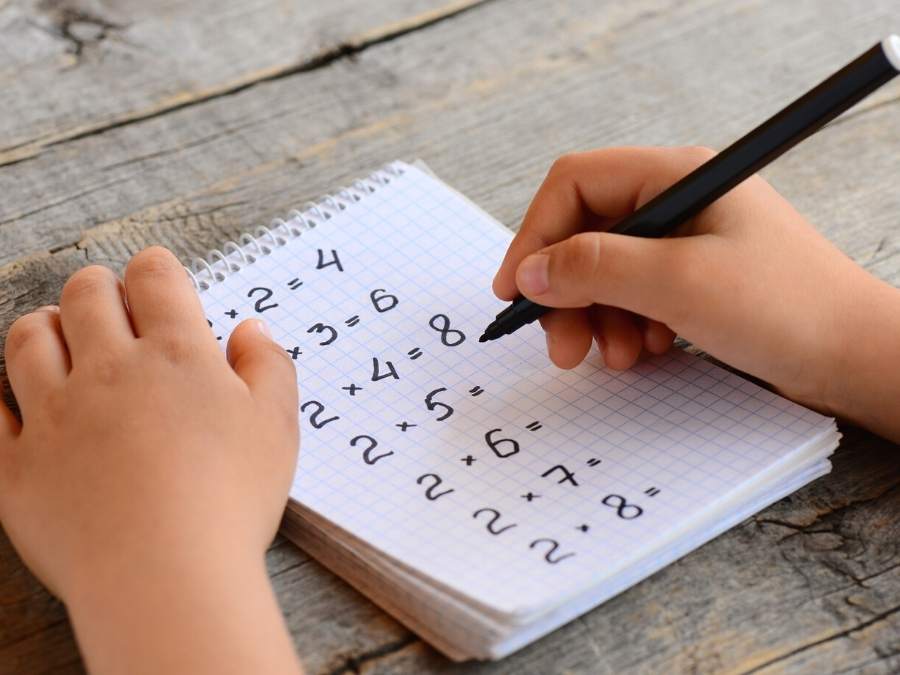5 Steps to Help Your Child Catch Up on Math
Is your child behind in math? Use these 5 easy steps to help them catch up math without feeling overwhelmed.

When you’re struggling to help your child catch up on math, it can be completely overwhelming. (I know, because I’ve been there.)
But don’t despair, because your child really CAN gain ground in math. It may not happen overnight, but with consistent effort, it WILL happen.
It’s a little bit like trying to eat an elephant . . . you can’t do it all at once, but you can succeed one bite at a time.
These five easy steps can help you move forward with confidence as you “eat the math elephant” in your homeschool.
This post is sponsored by CTCMath. I received a free CTCMath Homeschool Family membership and was compensated for my time. See my Disclosure Policy for more information.
5 Steps to Help Your Child Catch Up on Math
1. Find out what your child knows.
The very first thing to do is determine exactly what your child knows and where they are struggling. You could do this with a placement test, but as a homeschool parent, you probably don’t need to.
Most likely you will be able to simply observe what they do and do not know. For example, you could try some fact practice worksheets or flash cards to determine whether or not they have mastered basic math facts.
Once you know what your child knows and what they still don’t understand, you’re ready for the next step.
Don’t miss this! CTCMath offers free math placement tests!
2. Start with basic concepts.
Next, start with the most basic thing that the student doesn’t understand. Don’t try to work on long division if they haven’t mastered the basic division facts yet!
Remember, math builds on itself. It’s vitally important to go back to the first weak spot and build a solid math foundation before adding more advanced concepts. After all, a student will never be stronger in math than they are in their weakest spot.
Focus on a real understanding of math instead of just rote memorization. For example, make sure your child understands the relationship between addition and subtraction, and the relationship between multiplication and division. Then build on that knowledge.
Many kids who are trying to catch up on math will benefit from using manipulatives to illustrate math concepts. Don’t be afraid to use things like color tiles, base ten blocks, or fraction circles to make math more understandable.

3. Help them understand math problems.
When you are certain that your child has mastered the basics, it’s time to move on to applying math to find solutions to problems.
Help your child learn how to break a problem down into its steps before beginning. For instance, when my son was struggling to learn long division, we broke it down into 4 steps: divide, multiply, subtract, bring down.
FREE TRIAL! Try out CTCMath to help your child catch up on math.
Word problems require more advanced application of math skills, and obviously kids can’t get an answer if they don’t understand the question. Be sure to teach your child what to do when the encounter specific math terms in a word problem.
For example, kids need to know that when a math problem asks for the “sum,” they need to add. Introduce these terms clearly and demonstrate what to do with each specific term.
4. Gradually increase difficulty.
As your child becomes proficient in a particular math skill, you can slowly increase the difficulty of the problems.
This does NOT mean that they should be handed an entire worksheet of more complicated problems! Instead, add a couple more challenging questions to a set of problems that they are already confident in solving.
In this way you can avoid overwhelming your child while still challenging them and helping them move forward.
5. Practice consistently.
Finally, practice math concepts consistently. Smaller amounts of practice done daily will benefit your child much more than one big work session once a week.
We’ve all heard the old saying, “Practice makes perfect.” That statement may not be 100% true, but practice always yields progress. And THAT is the goal when you are helping your child catch up on math.

Catch Up on Math with CTCMath
Sometimes homeschool parents struggle to explain math concepts clearly to their kids. (I happen to be one of those parents.)
If this sounds like you, CTCMath can help! Their self-paced video tutorials are a great way to help kids catch up math without getting overwhelmed.
And even better, the CTCMath Homeschool Family membership is available now for 50% off, making it an affordable option for homeschool families.
